
It has been nearly five years since hurricanes Irma and Maria impacted the U.S. Virgin Islands and the recovery continues. While many individuals, organizations, and federal agencies, including the Federal Emergency Management Agency (FEMA), helped to provide relief immediately after the disaster, there is still work to be done. Long-term recovery requires continued coordination and collaboration among multiple federal partners.
FEMA’s Interagency Recovery Coordination group has continually supported the territory in coordinating post-disaster resources which includes providing access to nongovernmental financial resources that may help the U.S. Virgin Islands meet needs that FEMA, the territory, and other programs cannot meet.
In the five years since the storms, at least six recovery support functions were activated to support the long-term recovery efforts for the territory: health and social services, infrastructure systems, natural and cultural resources, utilities, housing, and economic recovery, all of which have been funded by federal partners listed below.
U.S. Department of Health and Human Services was the mission assigned to complete the assessment and prioritization of community healthcare needs, restore healthcare and social service functions, and improve resilience and sustainability of the healthcare system. HHS conducted grant writing workshops, coordinated the Emergency Prescription Assistance Program, and conducted training for improved shelter operations.
U.S. Army Corps of Engineers, under the infrastructure support function, implemented the Blue Roof program and installed more than 3,600 fiber-reinforced plastic roofs to protect homes from the elements until permanent repairs were made. They also assisted with the removal of debris from the territory.
U.S Environmental Protection Agency (EPA) worked with local governments and citizens to keep hazardous materials from impacting the environment. EPA assisted with the collection and disposal of hazardous waste materials.
U.S. Department of the Interior’s Natural and Cultural Resources Recover Support Function’s USVI mission was to support the territory’s unmet needs for natural and cultural resource recovery. NCR deployed historical architects and archaeologists to conduct 92 damage assessments and cost estimates on historic/archeological sites.
They assisted the University of the Virgin Islands and non-governmental organizations with coral restoration and grant applications for coral nurseries. The NCR mission assigned a team from the Smithsonian Institute and the National Archives and Records Administration to provide technical assistance and cost estimates for the repair of 27 damaged libraries, museums, and archives. They also coordinated Smithsonian’s Heritage Emergency and Response Training.
U.S. Department of Energy assessed damage immediately following the storm and assisted the territory in restoring power. DOE continues to collaborate with the territory to secure funding and provide technical assistance.
U.S. Department of Housing and Urban Development’s mission was to assist the territory in addressing unmet needs for housing recovery in connection with a comprehensive and sustainable long-term community recovery plan, including hazard mitigation, restoration of infrastructure and economic revitalization. HUD collaborated to provide counseling for local housing providers and grant writing workshops to non-governmental organizations.
U.S. Economic Development Administration’s mission was to enable local public and private sector partners to return economic and business activities to a healthy state and develop new business and employment opportunities that result in vibrant and resilient economies. Early in the recovery, EDA held a Capital Development Forum with the USVI Office of the Lieutenant Governor, Federal Reserve Bank of New York, Federal Deposit Insurance Corporation and local lenders.
Identified needs for financial literacy, business planning, and gap financing options for USVI small businesses and entrepreneurs, reviewed federal resources available to repair, harden or expand commercial infrastructure (airports, wastewater facilities, incubators, marine and tourism facilities) and increased business recovery services through Minority Business Development Agency small business workshops and consultation on continuity planning, bid preparation and disaster loan assistance.
EDA continues to provide workshops and webinars in collaboration with national and local agencies, businesses and nonprofit organizations. Through FEMA’s IRC efforts, USVI businesses were able to access information on how to compete and receive project awards with federal funds. Businesses were able to learn more about how to obtain contractor license bonds, which was a prior barrier for smaller firms pursuing federally funded contracts.
The IRC group, in partnership with Small Business Administration, Virgin Island Economic Development Authority, and Small Business Development Center, hosted a workshop to present information on the Surety Bond Guarantee Program. This resulted in a significant increase in the issuance of surety bonds from August 2021 to May 2022—resulting in a net increase of more than $7 million in Surety Bond Guarantees issued.
FEMA’s IRC group continues to collaborate with federal and local transportation and utility agencies on several projects. To date, nine federal agencies have obligated more than $1.4 billion to the territory to support recovery.





